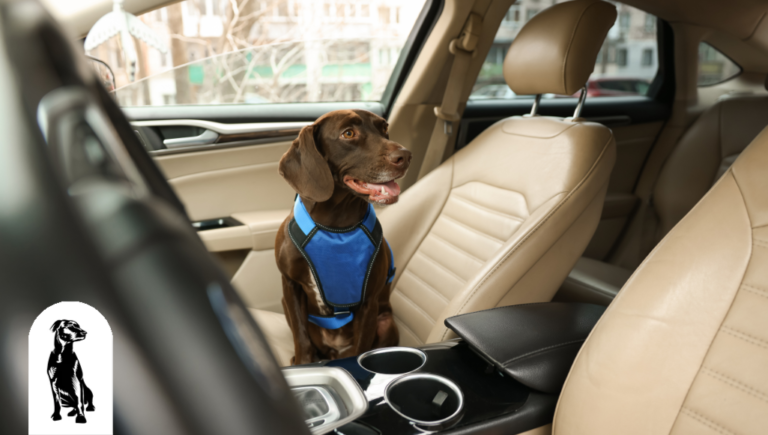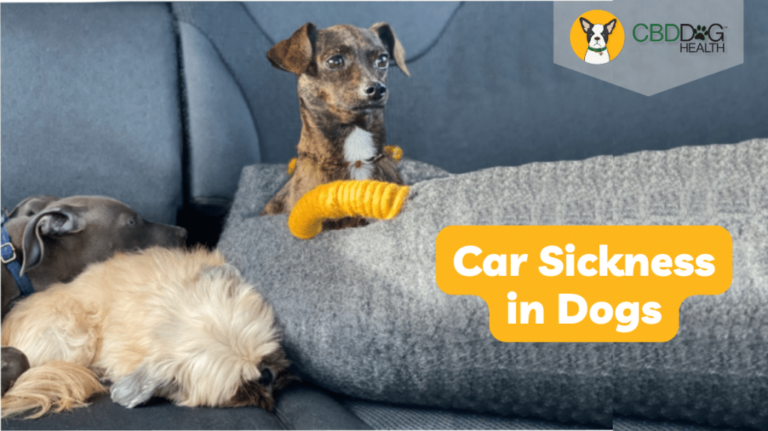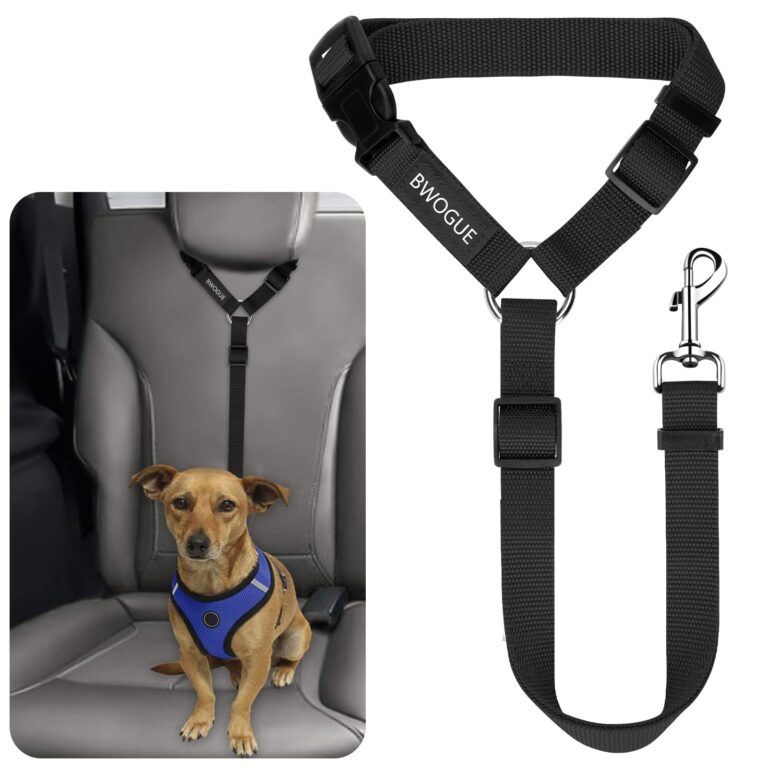How to Safely Leave a Dog in a Car?: Ultimate Guide
Never leave your dog in a car without proper ventilation and temperature control. Ensure they have water and shade.
Leaving a dog in a car can be dangerous if not done correctly. Even mild temperatures can quickly escalate inside a vehicle, posing a risk to your pet’s health. It’s crucial to ensure your dog has access to fresh air and is protected from the sun.
Cracking windows or using sunshades can help, but they might not be enough on hot days. Always keep a bowl of water available for hydration. Short trips are safer, but if you must leave your dog for an extended period, consider alternatives like pet sitters or dog-friendly establishments. Prioritizing your dog’s safety is essential to prevent heatstroke and other potential hazards.
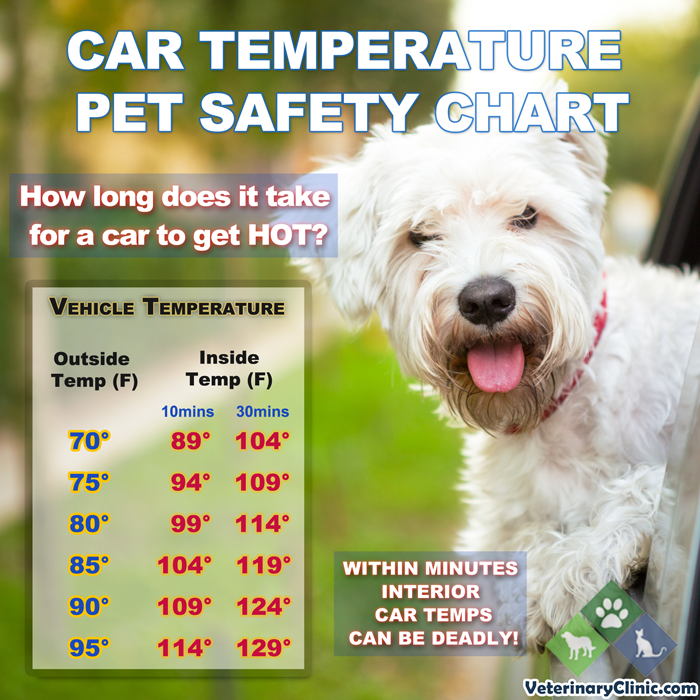
Credit: www.cambridgema.gov
The Risks Of Leaving Dogs In Cars
Leaving your dog in a car can be dangerous. Even short trips can put your dog at risk. Understanding these risks can help you keep your pet safe.
Temperature Dangers
Cars can heat up quickly. On a sunny day, the temperature inside a car can rise fast. Even with the windows cracked, the temperature can become unsafe. Dogs cannot cool down as easily as humans.
Heatstroke is a serious threat. Dogs can suffer from heatstroke within minutes. Symptoms include heavy panting, drooling, and weakness. If not treated, heatstroke can lead to death.
| Outside Temperature | Time in Car | Inside Temperature |
|---|---|---|
| 70°F | 10 minutes | 89°F |
| 70°F | 30 minutes | 104°F |
| 85°F | 10 minutes | 104°F |
| 85°F | 30 minutes | 119°F |
Legal Consequences
Leaving a dog in a car can be illegal. Many places have laws against it. You could face fines or even jail time. Rescuers may break your car window to save your dog.
Know your local laws. Each place has different rules. Some areas have strict penalties. Always check the laws before leaving your dog in the car.
- Research local pet laws
- Never leave your dog in a hot car
- Use pet-friendly travel options
Assessing The Necessity
Before leaving your dog in the car, you must assess the necessity. This means thinking about whether it’s really needed. A car can become very hot or cold quickly, putting your dog in danger. Making the right decision could save your pet’s life.
Avoiding Non-essential Situations
First, think about if it’s necessary to take your dog with you. If it’s just a quick errand, it might be better to leave your dog at home. Leaving your dog in the car should be a last resort.
- Go inside stores where pets are allowed.
- Ask a friend to watch your dog.
- Use drive-thru services.
Planning Ahead
Planning ahead is key to keeping your dog safe. This means having a plan before you leave the house. Think about the weather and how long you will be away from the car.
| Weather Condition | Action |
|---|---|
| Hot | Leave your dog at home. |
| Cold | Leave your dog at home. |
Make sure your car is well-ventilated. Use sunshades or park in the shade if you must leave your dog in the car.
- Check the weather forecast.
- Plan your stops in advance.
- Carry water for your dog.
By planning ahead, you can ensure your dog stays safe and comfortable. Remember, their safety is your responsibility.
Preparation Steps Before Leaving
Leaving a dog in a car requires careful preparation. Ensuring your dog’s safety involves several key steps. These steps help prevent stress and harm to your furry friend.
Proper Ventilation
Proper ventilation is crucial for your dog’s safety. Always leave windows slightly open. This allows fresh air to circulate. Never leave windows fully open. This can be a security risk. Use sunshades on windows. These help block direct sunlight and keep the car cooler.
Access To Water
Dogs need constant access to water. Place a spill-proof water bowl in the car. This ensures your dog stays hydrated. You can also use a pet water bottle. These bottles are designed to prevent spills. Hydration is essential to prevent overheating.
Comfortable Restraints
Use comfortable restraints to keep your dog safe. A seatbelt harness is a good option. It prevents your dog from moving around. Crates are also effective. They provide a secure space. Ensure the crate has enough ventilation. The restraint should not be too tight. Your dog should be able to move a bit.
| Preparation Step | Details |
|---|---|
| Proper Ventilation | Leave windows slightly open and use sunshades. |
| Access to Water | Provide a spill-proof water bowl or pet water bottle. |
| Comfortable Restraints | Use a seatbelt harness or a ventilated crate. |
Following these preparation steps helps ensure your dog’s safety. Remember, the goal is to minimize stress and keep your dog comfortable.
Choosing The Right Time And Weather
Leaving your dog in a car can be risky. The right time and weather are crucial. Always ensure your pet’s safety. This guide will help you understand the best conditions.
Ideal Temperatures
Ideal temperatures for leaving a dog in a car are between 50°F and 70°F. Outside this range, your dog could be at risk. A car can heat up quickly, even in mild weather. This can lead to heatstroke.
In colder weather, your dog could suffer from hypothermia. Always check the temperature inside the car. Use a thermometer if needed.
Weather Forecast Considerations
Check the weather forecast before leaving your dog in the car. Avoid days with extreme temperatures or sudden changes. Weather can change rapidly.
Look out for rain, snow, or high winds. These can make conditions unsafe for your dog. Keep an eye on the sky and be prepared to change plans.
| Weather Condition | Risk Level |
|---|---|
| Sunny and Hot | High |
| Cloudy and Mild | Low |
| Rainy | Moderate |
| Snowy | High |
Remember to always monitor the weather and your dog’s condition. Safety should be your top priority.
Time Management While Away
Leaving a dog in a car, even for a short period, requires careful time management. This ensures your pet’s safety and comfort. Proper time management can prevent stress or harm to your furry friend. Below are essential tips on how to manage time effectively while away from your car.
Setting Time Limits
Always set a maximum time limit for leaving your dog in the car. This should be no longer than 10 minutes in mild weather. In warmer weather, even a few minutes can be dangerous.
To help with setting time limits, create a time management plan. Write down the specific tasks you need to do and estimate the time for each. This will help you stay within your set limits.
| Task | Estimated Time |
|---|---|
| Quick grocery run | 5 minutes |
| Picking up mail | 2 minutes |
| ATM withdrawal | 3 minutes |
Using A Timer
A timer is a crucial tool for managing your time while away. Set a timer on your phone or a portable timer before leaving the car. This ensures you return promptly.
Follow these simple steps to use a timer effectively:
- Set the timer to the maximum time limit you have decided (e.g., 5 minutes).
- Place the timer where you can hear it, like in your pocket or bag.
- Start the timer just before you leave the car.
Using a timer helps you stay aware of the time and prevents you from getting distracted. Make sure the timer is loud enough to alert you, even in a noisy environment.
By managing your time wisely with these tips, you can ensure your dog stays safe and comfortable while you are away.
Monitoring Your Dog
Leaving your dog in a car can be risky. To ensure their safety, monitoring them is crucial. With the right methods, you can keep an eye on your furry friend and ensure they remain comfortable and safe.
Using Technology
Technology can help you monitor your dog. Here are some tools you can use:
- Pet Cameras: Install a pet camera in your car. You can watch your dog in real-time from your phone.
- Temperature Monitors: Use a device to monitor the car’s temperature. It will alert you if it gets too hot or cold.
- GPS Trackers: Attach a GPS tracker to your dog’s collar. This will help you locate them if they escape.
Asking For Help
If technology is not an option, consider asking for help. Here are some ways to get assistance:
- Ask a Friend: Have a friend or family member stay with your dog while you are away.
- Pet Sitters: Hire a pet sitter to watch your dog in the car. They can ensure your pet’s safety.
- Store Employees: Request assistance from a nearby store employee. They can check on your dog periodically.
By monitoring your dog, you can ensure their safety and comfort. Whether you use technology or ask for help, these methods will help you keep your dog safe while they wait in the car.
Quick Return Strategies
Leaving your dog in a car can be risky. Using quick return strategies can help keep your furry friend safe. Here are some tips to ensure a quick return to your pet.
Staying Nearby
Always stay close to your car. Park your car in a visible spot where you can easily check on your dog. This helps you respond quickly if there is a problem.
Avoid parking in remote areas. Choose a parking spot near the entrance of the store or place you are visiting. This way, you can return to your car quickly if needed.
Keep your trip short. Plan your errands so you can be back in 5-10 minutes. This minimizes the time your dog is alone in the car.
Prioritizing Your Dog
Put your dog’s safety first. If the weather is too hot or cold, do not leave your dog in the car. Extreme temperatures can be harmful.
Use a timer. Set a timer on your phone to remind you to return to your car quickly. This ensures you do not get sidetracked.
Leave a note. Place a note on your dashboard with the time you left and your contact number. This alerts others if your dog needs help.
| Quick Return Tips | Description |
|---|---|
| Stay Nearby | Park in a visible, close spot. Keep your trip short. |
| Prioritize Safety | Avoid extreme weather. Use a timer and leave a note. |
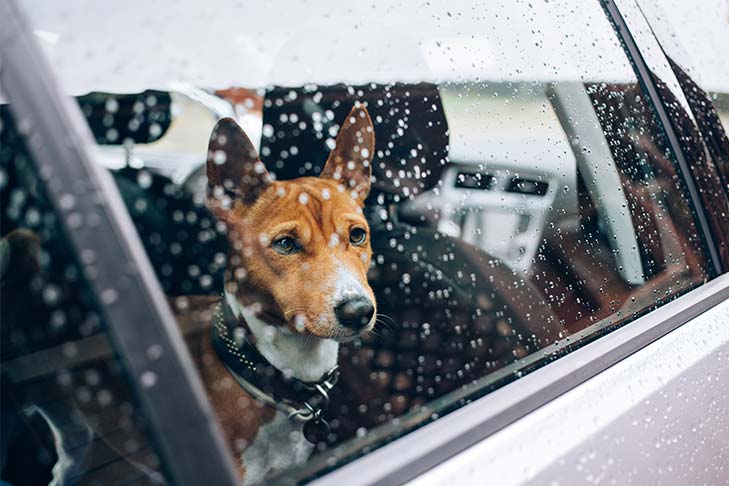
Credit: www.akc.org
Understanding The Signs Of Distress
Leaving your dog in a car can be risky. Understanding the signs of distress is crucial. This knowledge helps ensure your pet’s safety.
Recognizing Heatstroke
Heatstroke is a serious condition. Dogs can overheat quickly in cars. Here are some signs to watch for:
- Excessive panting and drooling: This indicates your dog is trying to cool down.
- Red or pale gums: These can show that your dog is overheating.
- Weakness or collapse: This is a severe sign of distress.
- Vomiting or diarrhea: These symptoms can occur with heatstroke.
- Rapid heart rate: Feel your dog’s chest to check.
Immediate Actions To Take
If you see any of these signs, act quickly. Here’s what you should do:
- Move your dog to a shaded area: This helps lower their body temperature.
- Offer cool water: Let your dog drink small amounts.
- Use cool (not cold) water: Wet towels or a sponge can help.
- Contact your vet: Call them immediately for advice.
- Monitor your dog: Watch for improvement or worsening signs.
| Sign of Distress | Immediate Action |
|---|---|
| Excessive Panting | Move to shade, offer water |
| Red/Pale Gums | Cool with water, call vet |
| Weakness/Collapse | Contact vet, monitor closely |
| Vomiting/Diarrhea | Offer water, cool with towels |
| Rapid Heart Rate | Cool with sponge, call vet |
Alternatives To Leaving Your Dog
Alternatives to Leaving Your Dog are essential to consider for the safety and well-being of your furry friend. Leaving your dog in a car can be dangerous. High temperatures and lack of ventilation can lead to severe health risks. Instead, explore these safe and enjoyable alternatives.
Dog-friendly Establishments
Many places welcome dogs. Look for dog-friendly establishments in your area. These places include restaurants, cafes, and stores that allow pets. Taking your dog with you can be a fun experience.
- Outdoor Cafes: Enjoy a meal with your dog by your side.
- Pet-Friendly Stores: Shop without leaving your dog behind.
- Parks and Trails: Take a walk with your dog in nature.
Pet Sitters And Daycare
If you need to leave your dog, consider hiring a pet sitter or using a doggy daycare. These options ensure your dog is cared for in a safe environment.
| Option | Benefits |
|---|---|
| Pet Sitters | Personalized care in your home. |
| Doggy Daycare | Socialization and playtime with other dogs. |
- Research local pet sitters and daycares.
- Read reviews and ask for recommendations.
- Visit the facility or meet the sitter.
Choosing the right option ensures your dog is happy and safe. Your dog deserves the best care, whether with you or a trusted caregiver.
Educating Others
Educating others on how to safely leave a dog in a car is crucial. Many pet owners are unaware of the risks and best practices. By spreading awareness, we can keep our furry friends safe and healthy.
Spreading Awareness
Spreading awareness is the first step. Talk to friends, family, and fellow pet owners about the dangers of leaving dogs in cars. Share stories and facts to make the message clear.
Use social media to reach a wider audience. Post informative articles, videos, and infographics. Engage with your community and encourage them to share the information.
| Method | Details |
|---|---|
| Social Media | Post articles, videos, and infographics |
| Community Events | Host or attend events to talk about pet safety |
| Flyers and Posters | Distribute flyers in local parks and pet stores |
Sharing Safe Practices
Sharing safe practices can save lives. Always make sure the car is well-ventilated if you need to leave your dog inside for a short time. Use a sunshade or window guard to keep the temperature down.
Keep a bowl of water in the car to prevent dehydration. Never leave your dog in a car for more than a few minutes, even with precautions.
- Use a sunshade to block direct sunlight.
- Keep windows slightly open for ventilation.
- Provide fresh water to prevent dehydration.
- Check on your dog frequently.
Educating others on these practices is essential. Make sure everyone knows how to keep their pets safe. Share this knowledge generously, and encourage others to do the same.
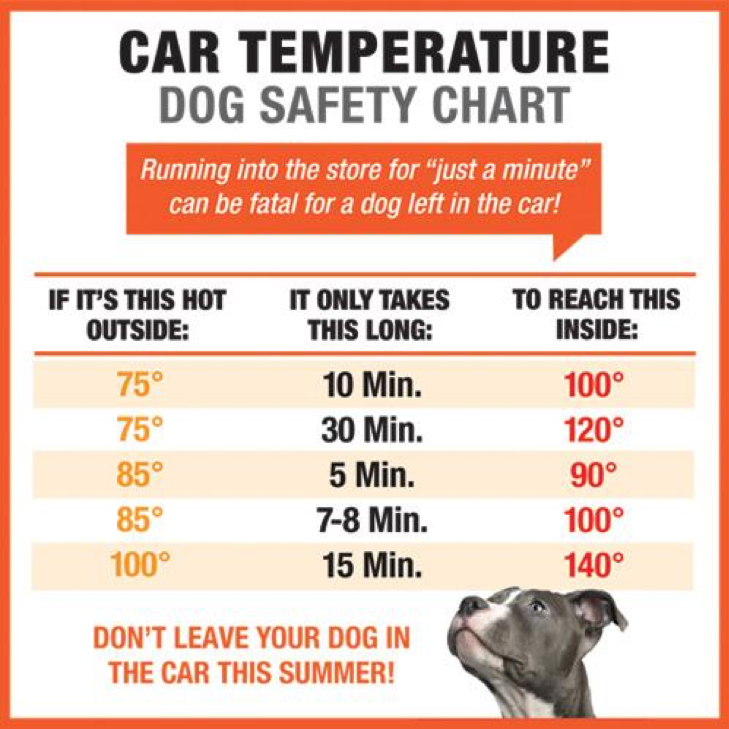
Credit: franklinpet.com
Frequently Asked Questions
How Long Can You Safely Leave A Dog In A Car?
Never leave a dog in a car for more than 10 minutes. Temperatures can rise quickly, causing heatstroke. Always ensure proper ventilation and safety.
Can I Leave My Dog In The Car On A Cool Day?
No, never leave your dog in the car, even on a cool day. Cars can quickly become dangerous.
What Is The Safest Way To Keep A Dog In The Car?
Use a crash-tested pet seatbelt or a secured crate. Attach the seatbelt to your dog’s harness. Place the crate in the back seat or cargo area. Ensure ventilation and comfort. Avoid front seats to prevent airbag injuries.
Is It Better To Leave Dog At Home Or In Car?
It’s safer to leave your dog at home. Cars can quickly become too hot or cold, risking your pet’s health.
Conclusion
Leaving a dog in a car requires careful planning and consideration. Always prioritize your dog’s safety and comfort. Never leave them unattended for long periods. Use sunshades and provide ventilation. Monitor the weather and your dog’s condition. By following these guidelines, you can ensure a safe and stress-free experience for your furry friend.
- Can I Get in a Taxi Without a Car Seat? - January 26, 2025
- Can I Get Chlamydia From a Toilet Seat? - January 26, 2025
- Can I Get an Uber With a Car Seat? - January 26, 2025

